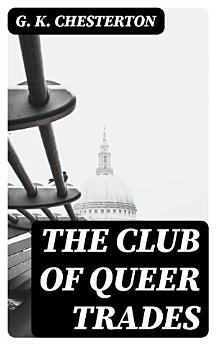The Club of Queer Trades
Sep 2022 · DigiCat
Ebook
108
Pages
family_home
Eligible
info
reportRatings and reviews aren’t verified Learn More
About this ebook
In "The Club of Queer Trades," G. K. Chesterton crafts a collection of short stories that deftly intertwine elements of detective fiction, satire, and philosophical inquiry. The book introduces a unique protagonist, the resourceful and inquisitive detective Basil Grant, who navigates a series of bizarre and whimsical cases. The stories are enriched by Chesterton's trademark wit and clever prose, presenting an exploration of human eccentricity while simultaneously critiquing contemporary societal norms and the limitations of conventional reasoning. Set against the backdrop of early 20th-century British society, the narratives invite readers to ponder the absurdities of life through a lens of playful yet profound inquiry. G. K. Chesterton (1874-1936) was a prolific writer known for his strong Christian beliefs, journalism, and philosophical essays. His experiences as a reporter and his deep engagement with social issues informed his writing, leading to a distinctive worldview that valued imagination and paradox. Chesterton's belief in the importance of myth and narrative culminated in this work, showcasing his fascination with the peculiar and the unorthodox in life and art. "The Club of Queer Trades" is a compelling read, perfect for those who appreciate clever storytelling that simultaneously entertains and provokes thought. Chesterton's ability to blend humor with profound insights grants readers both laughter and contemplation, making this collection an essential exploration of the curious intricacies of human nature.
About the author
G.K. Chesterton (1874–1936) was an English writer, philosopher, and critic, widely remembered for his succinct wit and pithy social commentary. Known for his vast array of works, which include philosophy, ontology, poetry, plays, journalism, public lectures, and detective fiction, he exerted a strong influence on both his contemporaries and future writers. His literary style combined elements of fantasy, mystery, and allegory alongside his vibrant Christian apologetics, which were integral to much of his writing. One of his notable works, 'The Club of Queer Trades' (1905), is a collection of linked short stories, featuring a club to which admission requires the invention of a unique profession. This book showcases Chesterton's penchant for the whimsical and the profound, suffused with humor and a touch of the fantastic. A master of paradox and a defender of the common man, Chesterton's writing remains relevant for its insightful critiques of modernity and enduring appeals to decency and common sense. His prolific output includes other famous titles such as 'The Man Who Was Thursday' and his much-loved 'Father Brown' series of detective stories. Chesterton's influence can be seen in the works of various authors, including C.S. Lewis and Jorge Luis Borges, and his legacy persists as a towering figure of 20th-century literature.
Rate this ebook
Tell us what you think.
Reading information
Smartphones and tablets
Install the Google Play Books app for Android and iPad/iPhone. It syncs automatically with your account and allows you to read online or offline wherever you are.
Laptops and computers
You can listen to audiobooks purchased on Google Play using your computer's web browser.
eReaders and other devices
To read on e-ink devices like Kobo eReaders, you'll need to download a file and transfer it to your device. Follow the detailed Help Center instructions to transfer the files to supported eReaders.








